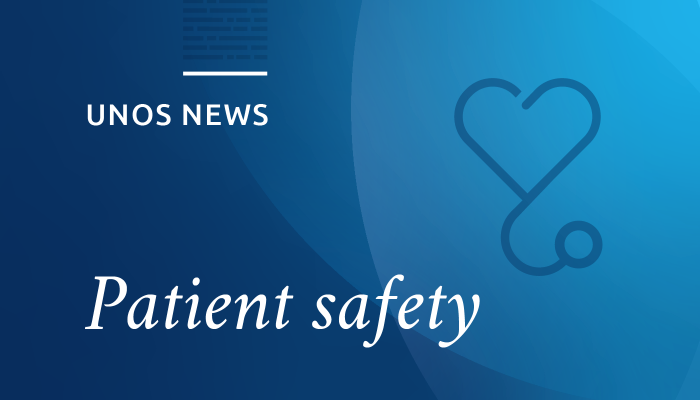Assisting members in their efforts to assure the safety of transplant patients and living donors is a top OPTN priority. As the OPTN contractor and hub of the transplant network, UNOS is in a unique position to respond quickly to aid members in their corrective action response to transplant-related patient safety situations. Not only can we assist your efforts to reduce or eliminate specific and time-sensitive risks to patient health and public safety at your facility, but we also can identify and report on trends, and consult with member organizations and federal agencies to address global issues to benefit the entire transplant community.
To do this most effectively, we need your help! As transplant center, OPO and histocompatibility lab members, no one has a greater commitment than you do to safe, effective and accessible organ transplants for those suffering from end-stage organ disease and care for those who generously engage in living donation. You are the first to become aware of process breakdowns and other events that may compromise transplant and donation-related patient safety. When you report such events to UNOS promptly, we can help you to resolve the risk, and we also use the information to identify common problems encountered by our members. This informs and helps to shape member education and policy development.
For these reasons, we urge you to please promptly report, using the Improving Patient Safety portal in Secure Enterprise, events that threaten:
- transplant recipient or living donor patient health or public safety
- the integrity of or trust in the transplant system as a whole
OPTN policy requires that the following events be reported:
- Host OPO members must report events involving unexpected potential or proven transmission of a medical condition from donor to transplant recipient, including infections and malignancies discovered after procurement of a donor organ.
- OPO members must report to the OPTN any instances where transplant center staff leave the operating room without allowing the OPO to package and label the organ in accordance with OPTN policy.
- Transplant centers must report all instances of living donor deaths and failure of the living donor’s native organ function within 72 hours after the program becomes aware of the living donor death or failure of the living donor’s organ function. Transplant centers must report these instances for a period of two years from the date of donation.
- Transplant centers must report all instances of living donor organs recovered but not redirected and not ultimately transplanted to the intended recipient within 72 hours of organ recovery.
We strongly encourage online reporting, but if you do not have access to Secure Enterprise, you can call the OPTN Member Reporting line toll-free at 866-787-4909.
Note that UNOS must notify HRSA when the following events are reported:
- transplant (or near-miss transplant) of the wrong organ into a recipient
- suspected or confirmed HIV disease transmission from a donor (deceased or living) to a transplant recipient
- living donor death, regardless of when it occurs or cause of death
- failure of a native organ in a living organ donor
- evidence of an attempt to deceive the OPTN or government officials (e.g. falsifying medical records)
We are preparing additional information, which we will share with you in upcoming issues of the e-newsletter and other communications.

